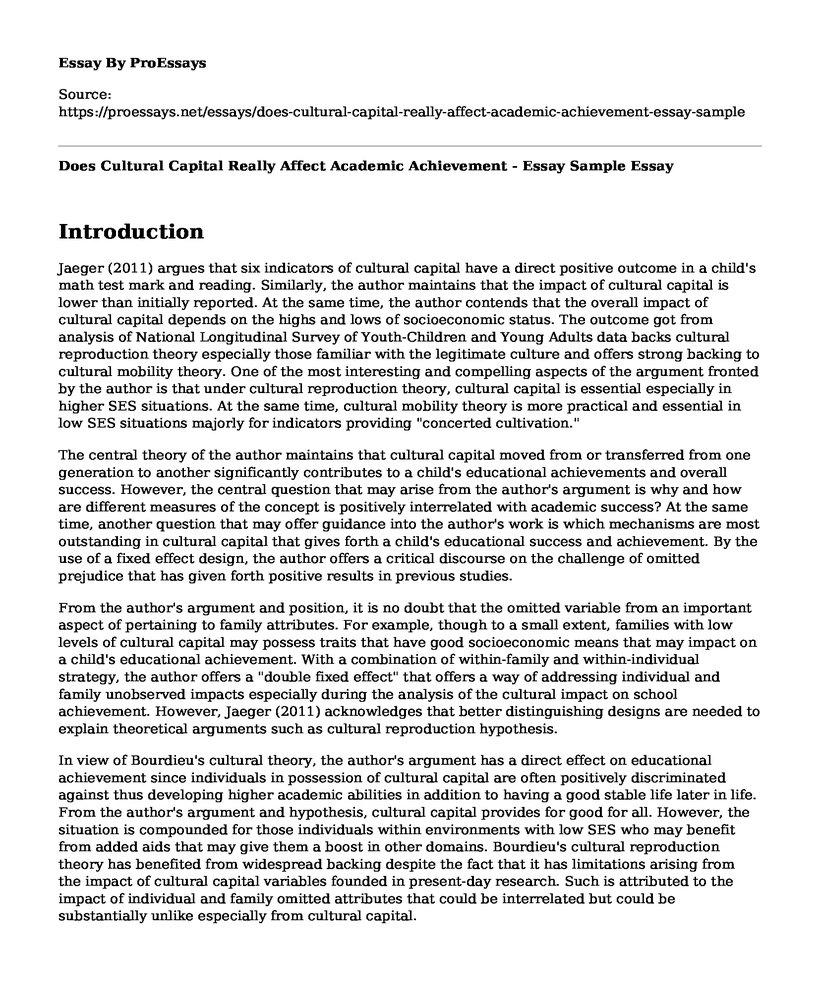Introduction
Jaeger (2011) argues that six indicators of cultural capital have a direct positive outcome in a child's math test mark and reading. Similarly, the author maintains that the impact of cultural capital is lower than initially reported. At the same time, the author contends that the overall impact of cultural capital depends on the highs and lows of socioeconomic status. The outcome got from analysis of National Longitudinal Survey of Youth-Children and Young Adults data backs cultural reproduction theory especially those familiar with the legitimate culture and offers strong backing to cultural mobility theory. One of the most interesting and compelling aspects of the argument fronted by the author is that under cultural reproduction theory, cultural capital is essential especially in higher SES situations. At the same time, cultural mobility theory is more practical and essential in low SES situations majorly for indicators providing "concerted cultivation."
The central theory of the author maintains that cultural capital moved from or transferred from one generation to another significantly contributes to a child's educational achievements and overall success. However, the central question that may arise from the author's argument is why and how are different measures of the concept is positively interrelated with academic success? At the same time, another question that may offer guidance into the author's work is which mechanisms are most outstanding in cultural capital that gives forth a child's educational success and achievement. By the use of a fixed effect design, the author offers a critical discourse on the challenge of omitted prejudice that has given forth positive results in previous studies.
From the author's argument and position, it is no doubt that the omitted variable from an important aspect of pertaining to family attributes. For example, though to a small extent, families with low levels of cultural capital may possess traits that have good socioeconomic means that may impact on a child's educational achievement. With a combination of within-family and within-individual strategy, the author offers a "double fixed effect" that offers a way of addressing individual and family unobserved impacts especially during the analysis of the cultural impact on school achievement. However, Jaeger (2011) acknowledges that better distinguishing designs are needed to explain theoretical arguments such as cultural reproduction hypothesis.
In view of Bourdieu's cultural theory, the author's argument has a direct effect on educational achievement since individuals in possession of cultural capital are often positively discriminated against thus developing higher academic abilities in addition to having a good stable life later in life. From the author's argument and hypothesis, cultural capital provides for good for all. However, the situation is compounded for those individuals within environments with low SES who may benefit from added aids that may give them a boost in other domains. Bourdieu's cultural reproduction theory has benefited from widespread backing despite the fact that it has limitations arising from the impact of cultural capital variables founded in present-day research. Such is attributed to the impact of individual and family omitted attributes that could be interrelated but could be substantially unlike especially from cultural capital.
Conclusion
The article provides for a stronger argument since it captures measurements from a wide cultural setting in addition to picking numerous traits from the subjects that play a critical role in supporting the core theory of the subject of cultural capital concerns. As such, the author's attribution on the weak strength of the theory is based on the substantive effect in line with expounding on educational disparities.
References
Jaeger, M. M. (2011). Does cultural capital really affect academic achievement? New evidence from combined sibling and panel data. Sociology of education, 84(4), 281-298.
Cite this page
Does Cultural Capital Really Affect Academic Achievement - Essay Sample. (2022, Nov 06). Retrieved from https://proessays.net/essays/does-cultural-capital-really-affect-academic-achievement-essay-sample
If you are the original author of this essay and no longer wish to have it published on the ProEssays website, please click below to request its removal:
- Research Paper on Online Learning
- Critical Summary for "Fathers Are Parents, Too!" Paper Example
- Research Paper on Violence in Schools: Physical, Psychological and Sexual Harms
- A Childhood Dream Fulfilled: Essay Sample on My Journey to Becoming a Nurse
- Early Childhood Education: A Critical Process for Society - Essay Sample
- Essay on John: A Hardworking & Open-Minded Teacher Who Unexpectedly Became Successful
- Free Essay: Strategies Used By Teachers to Teach Bilingual English Learners Effectively







